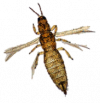About the Project
Project title: Development and implementation of biological control tactics for key vegetable insect pests in the southeastern US
Mission: Advance biological control in organic tomato and cucurbit production in the southeastern US
 We are a group of scientists and educators from Florida, Georgia, and the Carolinas working toward the long-term goal of increasing and conserving natural enemies in organic vegetable production in the southeastern US. This will be achieved through targeted research projects that improve biological control through releases and natural enemy conservation. We will disseminate knowledge and results from our studies, as well as those from relevant projects, to our stakeholders including organic vegetable farmers. This project is funded by a grant from the US Department of Agriculture, National Institute of Food and Agriculture, Organic Agriculture Research and Extension Initiative (OREI) Program.
We are a group of scientists and educators from Florida, Georgia, and the Carolinas working toward the long-term goal of increasing and conserving natural enemies in organic vegetable production in the southeastern US. This will be achieved through targeted research projects that improve biological control through releases and natural enemy conservation. We will disseminate knowledge and results from our studies, as well as those from relevant projects, to our stakeholders including organic vegetable farmers. This project is funded by a grant from the US Department of Agriculture, National Institute of Food and Agriculture, Organic Agriculture Research and Extension Initiative (OREI) Program.
The volume and value of organic produce has increased dramatically in the past two decades. Currently, there are approximately 500 acres of organic cucurbits and 750 acres of organic tomatoes in the southeastern US. Despite the small overall acreage, organic production of tomatoes and cucurbits generates significant income for many small and medium sized farms in the region.
Th e production of organic tomatoes and cucurbits in the Southeast is limited by three key pests: twospotted spider mite (TSSM), sweetpotato whitefly (SWF) and thrips (most notably the western flower thrips and the tobacco thrips). Feeding by these pests can cause yield loss. For example, TSSM can cause up to 50% loss in fruiting vegetables. More significantly, whiteflies and thrips are also vectors of important viral diseases of tomatoes and cucurbits, such as Tomato yellow leaf curl virus and Cucurbit lead crumple virus (by whiteflies), and Tomato spotted wilt virus (by thrips). Whitefly-transmitted viruses can cause up to 80% loss annually in cucurbit crops in north-central Florida.
e production of organic tomatoes and cucurbits in the Southeast is limited by three key pests: twospotted spider mite (TSSM), sweetpotato whitefly (SWF) and thrips (most notably the western flower thrips and the tobacco thrips). Feeding by these pests can cause yield loss. For example, TSSM can cause up to 50% loss in fruiting vegetables. More significantly, whiteflies and thrips are also vectors of important viral diseases of tomatoes and cucurbits, such as Tomato yellow leaf curl virus and Cucurbit lead crumple virus (by whiteflies), and Tomato spotted wilt virus (by thrips). Whitefly-transmitted viruses can cause up to 80% loss annually in cucurbit crops in north-central Florida.
Management of these three key pests in organic production is hindered by a lack of chemical options. Pest- and virus-resistant cultivars are not completely damage-free. Neither pesticides nor resistant cultivars can serve as stand-alone management tools. The successful management of spider mites, whiteflies and thrips in organic production will require an integrated approach, which includes biological control.
Our stakeholders understand the value of biological control. They are also interested in developing biological control programs for their operations. At the same time, our stakeholders lack confidence in identifying and using released or endemic natural enemies. There are significant gaps between the need for biological management solutions and the practical knowledge on the diversity and conservation of endemic natural enemies and the use of produced natural enemies for augmentative releases.
In order to improve the implementation and knowledge of biological control in organic tomato and cucurbit production in the southeastern US, we develop this project to:
- Improve augmentative releases of predatory mites to control spider mites, whiteflies and thrips. Under this objective, we will determine the optimal release timing for Phytoseiulus persimilis (against TSSM) and Amblyseius swirskii (against whiteflies and thrips); develop tomato-adapted strains of the predatory mites; develop a predatory mite rearing system for small organic farmers; evaluate the compatibility of the predatory mites with OMRI materials; assess the impacts of biological control on virus spread; and identify the economic benefits of biological control.
- Identify and conserve natural enemies of spider mites, whiteflies and thrips. Under this objective, we will survey for and identify endemic natural enemies of thrips and whiteflies in the Southeast organic tomato and squash systems; determine the compatibility of endemic natural enemies with OMRI materials; and examine predation and other interactions between endemic and released predatory mites.
- Improve stakeholder knowledge of biological control in organic cucurbits and tomatoes. Under this objective, we will conduct outreach and extension activities to reach and educate our stakeholders. These activities may include field days, grower meetings, organized conferences, webinars, instructional videos, articles and updates on this website, and trade and scientific journals.
Project contact:
Juang Horng “JC” Chong
Associate Professor and Extension Specialist
Clemson University
Department of Plant and Environmental Sciences
Pee Dee Research and Education Center
2200 Pocket Road, Florence, SC 29506
E-mail: juanghc@clemson.edu
Phone: 843-519-0479
Funding

This project was funded by the Organic Research and Extension Initiative (OREI), part of the USDA National Institute of Food and Agriculture, grant number 2018-51300-28425
